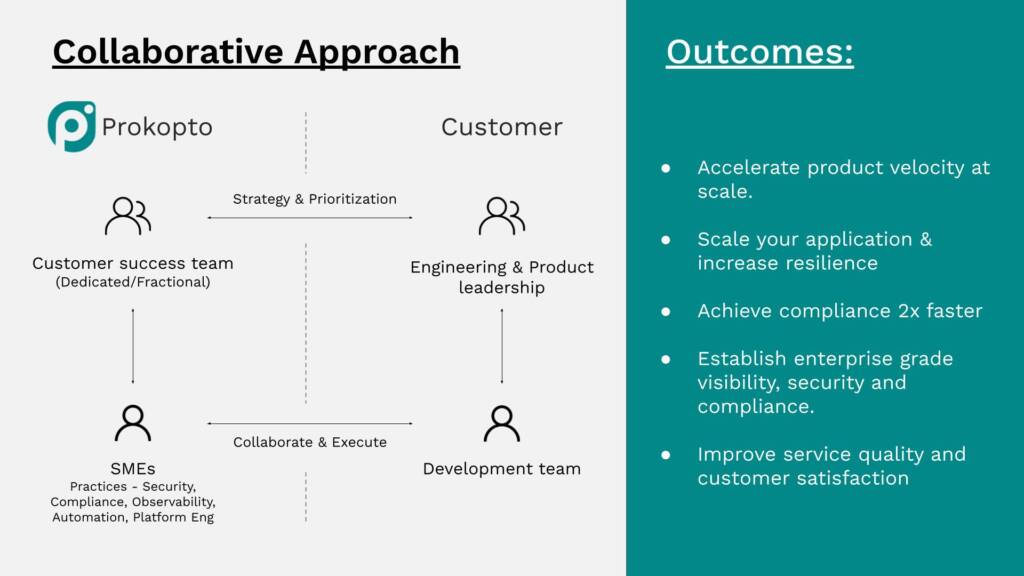
Scaling your cloud operations team

Naren Ravilla
Founder & CEO
Introduction
“A report by Deloitte indicated that 68% of executives are concerned about talent shortages and the impact of losing critical employees from their organizations.”
When discussing with C-level executives and leaders, a significant concern often revolves around the risk of losing a key individual – someone whose absence could severely impact the organization. While the loss of critical resources is inevitable, it is the responsibility of leaders to design organizations in a manner that scales effectively. Although scaling your operations is challenging, the benefits, such as increased efficiency and reliability, are significant. Many organizations strive to achieve this but frequently need help with where to begin and the best approach.
Site reliability engineering (SRE), DevOps and Cloud Operations are often the place where the most opportunity for growth can be found. The challenge is choosing the right approach to scaling your team in these areas. In this article, we will discuss the various approaches to addressing these challenges for your SRE team.
Site Reliability Engineering
Google originally developed the SRE role to manage its vast infrastructure. Site Reliability Engineering (SRE) is a discipline that incorporates aspects of software engineering and applies them to infrastructure and operations problems. The main goal is to create scalable and highly reliable software systems.
The key SRE functions are:
- Service Level Objectives (SLOs)
- Monitoring and Alerting
- Incident Response
- Security and Compliance
- Reliability Engineering
- Capacity Planning
- Performance and Efficiency Optimization
- Automation and Tooling
Engineers proficient in all these functions are rare and difficult to find, underscoring the urgency of the talent shortage issue. Moreover, managing their schedules and priorities often becomes a bottleneck to management, creating delays and stress. Let’s explore the pros and cons of scaling an SRE team with generalists.
Scaling an SRE team with generalists
Pros:
- Versatility and flexibility – Generalists often have a wide range of skills to tackle various tasks and problems. They can easily switch roles and responsibilities as the team and organization’s needs evolve.
- Holistic problem solving – Generalists can communicate effectively with various stakeholders, including developers, product managers, and operations teams, fostering better collaboration.
- Ability to collaborate – Generalists can often effectively communicate with various stakeholders, including developers, product managers, and operations teams, fostering better collaboration.
Cons:
- Lack of deep expertise – Generalists lack deep expertise in specific areas, which is a disadvantage when dealing with complex, specialized problems.
- Potential for burnout – Generalists might be tasked with a broader range of responsibilities, which can potentially lead to burnout.
- Bottleneck/Scaling challenges – Everyone prefers interacting with a generalist who understands all SRE functions, but such generalists can become bottlenecks, creating key person dependencies and causing delays.
Scaling an SRE team with generalists offers several advantages, such as versatility and flexibility, enabling them to tackle diverse tasks and adapt to evolving team needs. Their holistic approach to problem-solving and ability to effectively collaborate with various stakeholders foster better communication and integration.
However, this approach also has drawbacks, including a lack of deep expertise for specialized problems, the potential for burnout due to a broad range of responsibilities, and bottleneck issues that can create key person dependencies and delays.
Scaling an SRE team with specialists
Pros:
Deep expertise – Specialists possess deep knowledge in their respective domains, allowing them to provide high-quality, optimized solutions for complex problems. They resolve issues quicker and more effectively within their area of expertise.
Advanced skill and methodologies – Specialists are up-to-date with their field’s latest technologies and methods, which can lead to innovative solutions and improvements.
Focused development – With a defined focus area, specialists concentrate on specific tasks without being distracted by unrelated issues, leading to focused development, enhanced accountability, and ownership.
Cons:
Siloed knowledge – Over-reliance on specific individuals can create bottlenecks and single points of failure. As a result, knowledge and expertise becomes siloed over time.
Coordination Challenges – Ensuring seamless integration and collaboration between specialists in different domains is challenging and requires additional coordination efforts.
Limited Flexibility – Specialists may find it challenging to adapt to tasks outside their area of expertise, reducing overall team flexibility.
Scaling an SRE team with specialists provides the advantage of deep expertise, allowing for high-quality, optimized solutions and quicker resolution of complex problems within their domains. Specialists, who stay up-to-date with the latest technologies and methods, drive innovation and maintain focused development, resulting in enhanced accountability and ownership.
However, this approach can lead to more than siloed knowledge, creating bottlenecks and single points of failure while also posing coordination challenges and reducing overall team flexibility. Specialists need help to adapt to tasks outside their expertise.
A common approach to scaling your SRE team
Now that we understand the pros and cons of both approaches, the most common strategy is to leverage the best of both worlds by balancing generalists and specialists.
The perfect mix of generalists and specialists consists of:
- Core Team of Generalists (Tech POCs) – A core team of generalists to handle requirements, interact with key stakeholders, and design the overall architecture and program structure.
- Subject Matter Experts (SME) – Build a small team of SMEs around essential SRE functions such as platform engineering, automation, database management, security, or performance optimization.
The glue that holds these two groups together is conducting cross-training exercises. Companies can address each group’s drawbacks by encouraging specialists’ rotation through SRE practices and fostering knowledge-sharing sessions between generalists and specialists.
Organizations can build robust and adaptable teams equipped to handle diverse challenges by strategically blending generalists and specialists. This approach also helps eliminate key-person dependency and reduces burnout.
The Prokopto methodology

Our collaboration model is based on a similar theory of balancing generalists and specialists for managing your cloud. By using this model, we can put the right people in the right places to help accelerate your efforts in reaching strategic goals. It could vary from increasing your security and compliance posture, bolstering your monitoring capabilities, or further optimizing your cloud spending so you can re-invest in other areas.
A common use case in pe-backed companies is their focus on accelerating product velocity. Our teams have experience helping companies strengthen their product’s weaknesses, which improves their customer satisfaction and provides opportunities for product growth. With our approach, we can enhance and augment your team with the necessary SMEs and provide strategic guidance every step of the way.
Usually, during this process, companies need to improve their compliance standards and establish enterprise-grade visibility across the organization. By fully integrating with your teams, we can truly partner with you and push you to sustainable growth.

